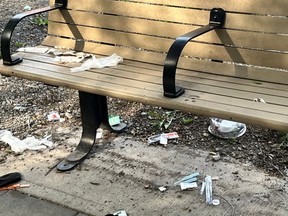Fear-mongering doesn’t help either. The City of Ottawa needs to use creative and proven methods of helping people and keeping them safe.

Article content
In the wake of recent discussions about the presence of drug paraphernalia in public spaces across Ottawa, it is disheartening to see calls for stigmatizing “prevention” strategies, including fear-based awareness campaigns.
To address concerns about drug use and homelessness expressed by some residents, Coun. Stéphanie Plante (Ward 12 Rideau-Vanier) was recently quoted in the Citizen as saying we should “go into high schools and scare the s — out of kids” and take young people on tours of encampments and safe consumption sites. This is reminiscent of the Scared Straight Tours in Vancouver and raises serious questions about those who hold power to effect change.
Advertisement 2
Article content
Article content
These kinds of proposals have also emboldened others to vilify, shame and stigmatize people who use drugs. All of this distracts from work already being done in the community to keep people safe and alive, and lends legitimacy to misinformation and ineffective solutions to various social issues. This harmful rhetoric not only fails to provide safer outcomes for drug users and the communities in which they live but also exacerbates the potential for harm for everyone.
The underlying issue here is a deeply ingrained culture of carcerality and coercion, where intimidation and fear-mongering are deemed acceptable means to force behavioural change. “Meeting people where they are at” shouldn’t mean that the care and support people need are contingent on them changing their behaviour. An attempt to control, disguised as care, was the foundation for the Drug Abuse Resistance Education (D.A.R.E.) program introduced in 1983, which we now know does not work to prevent or reduce harms associated with drug use among children.
We know that, like the D.A.R.E. program, prohibition and criminalization of drugs undermine the safety of drug users. None of these approaches addresses the toxic drug supply that has led to the poisoning and deaths of people who use drugs.
Advertisement 3
Article content
We must acknowledge that the relationships individuals have with drugs are complex — ranging from recreational or experimental use to self-medication or escapism. Awareness of this complexity moves us away from catchy slogan campaigns like “one pill can kill” or “just say no” towards more holistic and compassionate approaches to drug use, grounded in harm reduction.
So, what is meant by harm reduction, and what works to keep people safe and alive?
There are practical things we can do to reduce the harm caused by prohibiting the use and sharing of substances. These include giving everyone, including youth, who uses drugs access to education on harm-reduction techniques; a regulated and safe supply; clean tools and spaces to use; and access to treatment (if they consent to it). However, harm reduction isn’t just about drug use; it’s also about addressing broader systemic issues that produce so many different harmful and often traumatic outcomes.
In the book Saving Our Own Lives, Shira Hassan draws on years of experience to highlight that liberatory harm reduction is best understood as a political framework. This is an approach that communities use to resist and navigate the outcomes of systemic neglect and harm. Rather than treating harm reduction like a rigid framework, where some aspects are cherry-picked or rejected entirely, this approach encourages us to collectively ignite our creativity to create better conditions and outcomes for everyone in our communities.
Advertisement 4
Article content
I hope we can prioritize creativity and compassion over coercion, and focus on building supportive and life-affirming communities that respect privacy, dignity, and humanity. Let’s not try to scare children or treat people in encampments and safe consumption sites as spectacles.
We need creative solutions and a commitment to reduce harm, not dehumanizing scare tactics.
Farnaz Farhang (M.A. Criminology) is an Ottawa resident, researcher, and advocate.
Recommended from Editorial
Article content





